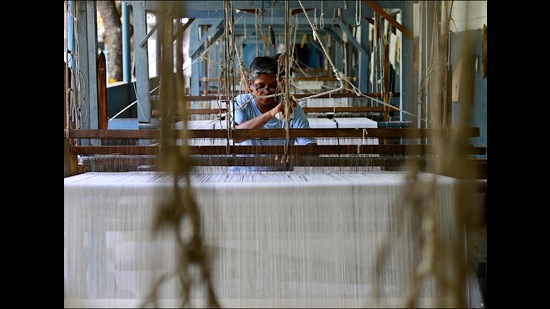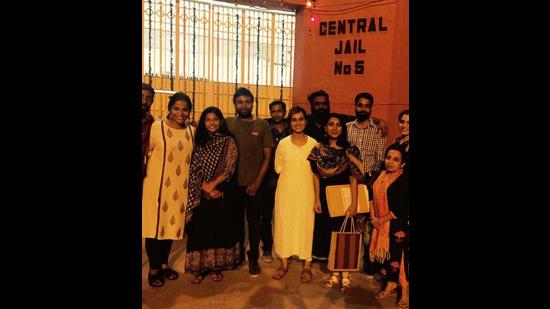Transforming the criminal justice system
Project Unlearn started by Tycia Foundation is about developing context based educational and life skills material which aims to bridge the gap between the existing literacy programs initiated inside the prison to improve education level among inmates.
Project Unlearn started by Tycia Foundation is about developing context based educational and life skills material which aims to bridge the gap between the existing literacy programs initiated inside the prison to improve education level among inmates.

Eleena George, Prison Reformation Lead, co- founded ‘Project Unlearn’ with the vision to reduce Gender Based Violence. With great motivation she became a Second Chance fellow where she got the opportunity to work with Tihar prison inmates. She leads operations at Tihar Jail, manages teaching and training of Peer fellows inside the prison school. She is focussed on creating a contextual correctional educational kit with the support of the inmates to prevent crime against women by closely working with ‘at risk youth’. While on the other hand, Saanchi M, is Co-founder and CEO at TYCIA Foundation. She previously worked for institutions like Ambedkar University’s Centre for Early Childhood Education Department (New Delhi) and Room to Read India. She has also played a role of facilitator in social entrepreneurship & leadership programs like Jagriti Yatra, WeCan and Pravah’s Changelooms.
Q.1 What is the vision behind Tycia Foundation?
Saanchi M: TYCIA Foundation has been working in this domain since the year 2017. The initial years went by trying to understand the geography and identifying the existing gaps. Gradually as we started creating a team to work in this field we realized that it is important to identify more change-makers and leaders from various walks of life who are passionate about prison reformation and can bring a new lens of innovation to the system. The biggest issue we are working on is to overhaul the ill equipped prison and criminal justice ecosystem, why it needs structural change within and who will lead it. This led to the initiation of the Second Chance Fellowship, which aims to create a platform and opportunity for individuals who are passionate about working towards transforming the state of the criminal justice system from macro to micro-level. Many micro-enterprises have been formed as an outcome of the fellowship which envisions resolving at least one long pending prison system issues. Better life Prison School is a full day long operational school which includes functional literacy, wage/self-skill training, life skill training, drug de-addiction and healthcare support inside prison. Project Unlearn, a context-based education and life skills intervention for young incarcerated men which aims to end gender based violence and crime by intensive workshops and sessions inside prisons and communities. Kunji - a Prison Helpline-Facilitating ex-inmates over phone with help of a location-wise data of various NGOs and government institutions that are working on issues that ex-inmates face, like Drug De-addiction, Mental health, Housing/Food/Clothing, Employment, Conflict Resolution, Life-Skills, Legal-Aid, Education. Project Rihai - A crowdfunding platform to get people out on bail who have completed their sentence and do not have money to provide bail. It is only done for inmates who are recommended by prison staff on the account of reformed behaviour in their prison time and do not have any financial support from families.
Q.2 What encourages you to work for this cause?
Eleena George: I started my journey with the TYCIA foundation as an intern and later went on to pursue a year-long fellowship (Second chance fellowship) and realized that prison is often neglected geography which needs even more attention. I started to build interaction with incarcerated males especially booked under crime against women to understand their world view and create a better fitted solution. Upon a realization and completion of my fellowship I persevered to create a safe space on the topics such as sexual consent, toxic masculinity and other topics related to violence and crime against women that are usually not discussed in the prison premises became my motivation to pursue something which was challenging but crucial. It is given that the rampant increase in acts of crime and violence against women coupled with high recidivism rates in India highlights the need to sensitize boys and young men on gender-related issues, crimes, and violence. The peer leaders were identified inside the prison that not only helped in creating a contextual curriculum called Pehal kit but were also trained to become facilitators. They conducted workshops and sessions on such topics in order to sensitize and prevent fellow inmates from inducing violence and strengthen the voices of youth about inequalities, nurturing them into change agents to prevent gender-based violence and crimes. Being able to create a safe space among men with the support of peer leaders to openly discuss and address these social issues became my motivation to continue to work in this field.
Q.3 Tell us about your experience working with these delinquent individuals?
Eleena George: My experience of working with my students in the prison has definitely changed the way I view the reformation and correctional institutions. Interaction with prison officials and different stakeholders in a prison setting helped me view the criminal justice system from their perspective. Every day in the prison is new learning as the challenges of teaching inside are different from that of any mainstream school or any community outside. Since it’s been four years now I often end up meeting ex-inmates in public places. It is interesting to see ex-inmates who were part of our program during their stay in the prison now volunteering and interning with us. Being in touch with them and seeing them wanting to live a life away from crime is truly a motivation and reinforces the idea of reformation and behavioral change.
Q.4 How have these prisoners helped with Tycia’s programmes?
Saanchi M: The peer leaders are identified inside the prison who work closely with us in facilitating all the activities in the prison. It helps to bring forth their leadership skills and mark their journey as change makers in prison as well as their community. They had a huge role in designing contextual educational content to sensitize men on gender-based violence and crime and taking classes with teachers. Post their release they continued to partake in workshops and sessions which were organized by us. During the lockdown, they supported the team in COVID relief work like Distribution of ration kit, masks, oxygen cylinder, and concentrators. They supported and led the project on creating awareness about vaccination in several communities. Helping people to book their slots and helping them with commuting from their home to the vaccination centers. Ex-inmates also supported fellow inmates who were released during the lockdown to depopulate the prison with transportation and ration.

Q.5 What activities do you engage in?
Eleena George: I support designing, implementing and co-leading the prison reformation interventions with my colleagues Gauri and Tabish. Moreover, I am leading ‘Project Unlearn’ which is an offshoot from Second Chance Fellowship and have created educational content to sensitize boys and young men on gender-based violence and crime by training men on conducting workshops and sessions in the prison and communities. Its primary initiative aims to address negative gender-based socializations, harmful gender norms and rape culture in correctional institutions and at-risk communities by creating safe spaces for boys and young men to discuss and understand gender-based violence at a deeper level.
Q.6 What are the future plans of the organisation?
The future plans for the organization is-
· To identify more change makers who are passionate and driven to work in the field of criminal justice system
· To work in more prisons and create a second layer of change makers in the prison.
· To work in more communities where crime rates are high and prevent men from inducing violence on women.
· To support/incubate new ideas and interventions of social entrepreneurs wanting to work towards transforming the criminal justice system.
Saanchi M
Get Current Updates on India News, Lok Sabha Election 2024 live, Infosys Q4 Results Live, Elections 2024, Election 2024 Date along with Latest News and Top Headlines from India and around the world.



